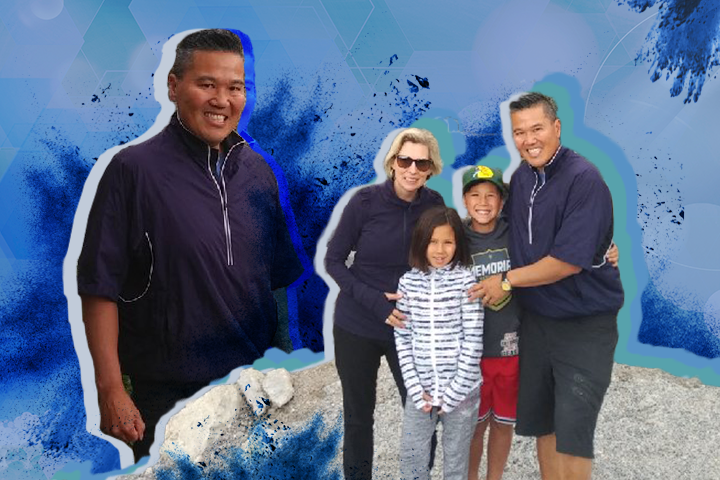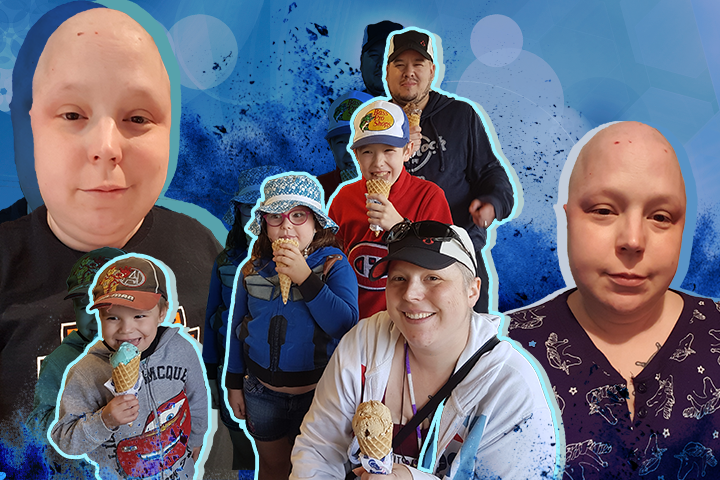When Fiona Kingsley Boyer was six months pregnant, she started to notice bruising on her legs.

She was also very itchy, symptoms she thought were normal for someone carrying a child.
That February of 2018, the 32-year-old woman from Scarborough, Ont. says doctors noticed a lump on her neck.
READ MORE: Cancer can severely damage your mental health. Why don’t we talk about it?
She went to the ER to get an X-ray on a Sunday night and by Monday, she got the grim news: she had cancer.
“I was like, ‘What about the baby? Because all you think about is the baby… you don’t care about yourself.'”
Kingsley Boyer was diagnosed with Hodgkin’s lymphoma. She was induced a month early before her due date and started chemotherapy two weeks after giving birth.
Fiona Kingsley Boyer pregnant. Photo by Thurka Gunaratnam. Art by Laura Whelan.
Doctors told her the cancer wouldn’t impact her unborn child, but Kingsley Boyer panicked.
“For days I thought I had days to live,” she said. “I began planning out my next five years with my kids.”
Getting a cancer diagnosis is one hurdle to jump over on your own, but when you have kids, it can add another layer of guilt, fear and anxiety. Some parents are separated from their children during chemotherapy, while others have a hard time explaining the diagnosis to their child.
Telling your kids about the ‘C’ word
Erlanger A. Turner, a licenced psychologist and assistant professor of psychology at Pepperdine University in Los Angeles, tells Global News most parents struggle to tell their children about their diagnosis.
“It is important to be honest; most children will notice changes in their environment,” he explained.
“Be prepared to openly discuss your chronic illness but keep the conversations age-appropriate for your child.”
You can start with a conversation about what cancer is or offer reading material to older children.
“Having a cancer diagnosis also comes with some uncertainty,” he continued. “It is OK to talk with your child about what is involved in treatment. Finally, be prepared for your child to be anxious or worried about your health.”

Some children will think your cancer diagnosis is their fault. Open communication about what the cancer is and where it came from can help clear up confusion.
Kingsley Boyer and her husband didn’t tell their three-year-old right away. The two waited to find out if Kingsley Boyer would lose her hair or not, because she knew it would bring up questions. Hodgkin’s lymphoma is treatable, especially when it’s detected early.
“We told her mommy was ‘very sick,’ but she was going to get better,” she continued. “We made sure it was clear I was going to get better.”
How your outlook on life can change
Just trying to be a parent can be tough as well.
“This may be the result of your body being exhausted from treatment or wanting to make sure they your child have an enjoyable time with you,” Turner said.
READ MORE: Southern Alberta mom uses art to help her cope with breast cancer
Some parenting styles also changes, he notes, and parents become more laid back. But it is still important for parents to discipline their child for inappropriate behaviour or breaking rules.
“Children may exhibit different behaviour to cope with their parent’s cancer such as anxiety, anger, or behavioural problems at school,” he explained.
“If you feel that you are struggling with finding effective behaviour management strategies, you should consider working with a licenced mental health professional or psychologist that can work with you and your family to help you cope with your diagnosis and improve your relationship with your child.”
Terri Mah’s outlook on life in general changed when he was diagnosed with Stage 4 pancreatic cancer in May, 2017. Mah had noticed pain on the left side of his body after his family moved from Saskatoon to Calgary that year.
Terri Mah and his family. Photo courtesy of Terri Mah. Art by Laura Whelan
The 47-year-old told Global News he was already stressed about moving, helping his two kids adapt to a new city and being a caregiver for his father-in-law, who also had cancer.
“It was such a hard thing to deal with because we had brought my father-in-law here and one month before I got diagnosed he passed away,” he said.
“Taking my kids to the hospice and saying goodbye… it was such a hard thing for me. That’s all I could picture… laying there and saying goodbye to my kids.”
Mah is now cancer-free and his children played a huge part of his healing. They motivated him, kept him going and today, he realizes his outlook on parenting and is quite different.
“[Cancer] made me stop and think,’You know what? Family is the most important to me… I am going to stop take that time and spend it with them.”
Some parents feel guilty after their diagnosis
For others, there is a sense of guilt. A cancer diagnosis could mean extra hospital visits, chemotherapy or extended bed rest — all of which takes time away from a child.
“Talk with your family about expectations and create a new plan for how to enjoy time together,” Turner said.
“For example, maybe you can’t play outside with your child but instead can play a board game or read a book together. The most important thing is that you are maintaining a good connection and making memories.”
For others, it becomes a loss of identity.
Mary Yusep, 27, is a single mom based in Edmonton. Yusep was diagnosed with thyroid cancer in fall 2018. Her son was five at that time and she didn’t tell him about the diagnosis at first.
There were some moments during her treatment where Yusep also had to be in isolation. She couldn’t speak with her son or even be in the same room with him.
Parents need more support
Julie Michaud, 38, was first diagnosed with Stage 3 breast cancer in September 2010. By May 2015, her cancer progressed to Stage 4.
“It returned in my sternum and lung,” she told Global News. “Last year it spread to my lungs and liver and a mass on my chest on top of remaining in my sternum.
“I am currently on my fifth round of chemotherapy.”
The Halifax-based woman was devastated. She was 40 weeks pregnant and felt a bump in her breastbone. “All I could think about was I would not see my three children grow up.”
She finds herself holding onto hope by continuing treatments, but she says the options for parents with terminal cancer get fewer and fewer.
“We cannot find any immunotherapy options for me within Canada that I can apply for,” she explained.
She says cancer patients need more support, especially those who are parents.
“Treatments exhaust you, appointments take up a lot of time, you get hospitalized, you don’t get to be a normal parent,” she says.
“Fear that this will be the last birthday I see or the last holiday I’ll be a part of is constant, especially with the dwindling options for treatment.”
Michaud says support is needed for partners, as well.
“We’ve had to rely on friends and family to make everything work,” she continued. “There’s no assistance for partners supporting cancer patients and their children, causing the possibility of burnout. We need more support available for parents with young children.”
For Kingsley Boyer, support also happens when we are honest about our cancer journey. She started documenting her story on social media for other parents to relate.
READ MORE: The stigma of more children after one is sick — Why some parents feel guilty
And growing up in a Sri Lankan and Tamil community, Kingsley Boyer also knows how hush-hush her own family would be if they found out about a family cancer diagnosis. For some communities, cancer is still seen as tucked away or a taboo.
“We wanted to be as open as possible.”











Comments